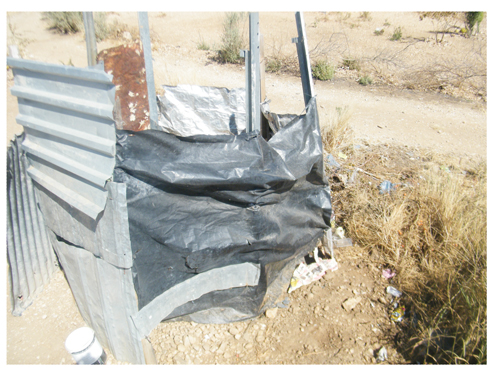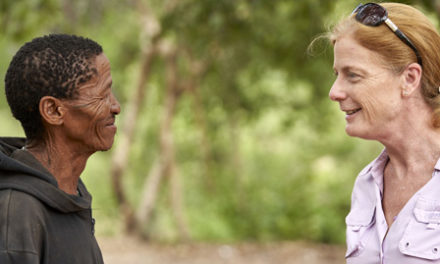
“Give us toilets”

A large group of families in the informal settlement of Havanna use this make-shift toilet which is fitted with a bucket.
The Sanitation Strategic plan for the period 2010/11 to 2014/15 is a framework that outlines the approaches and activities that the sanitation sector intends to take in order to achieve success in the medium term and provides an integrated picture of where the sanitation sector is going over the next five years. It was envisioned that by 2012, national sanitation coverage should reach 65%, urban coverage 92.6% and rural coverage 50%, however these figures are yet to be achieved.
Upon visiting some informal settlements in Windhoek, The Economist came across a large number of shacks with make-shift toilets made from plastic refuse bags which are used as bathrooms and are often shared by over five houses.
“Those toilets are only used for bathing, when nature calls we have to go to the field. We are suffering as you can see how we are living here. The government is not doing anything to help us. We need toilets, electricity and houses. This is a serious problem, we are suffering. When is the government going to help us?,” said one Havanna resident, who refused to be named.
She said because of the living conditions some people have resorted to stealing electricity. And because the water pumps are too far, some people are “renting” out carts to fetch water for other members of the community at N$5 a bucket adding that the government should provide them with houses from as little as N$300 a month.
According to the woman who is about 8 months pregnant and stays alone, City of Windhoek officials visited the informal settlement earlier last month and gave each house a number, and promised to provide each house with water.
“Municipality gave us numbers and said that they will give us water, but they did not say how long it will take for us to get the water. They did not mention building any toilets for us,” she said.
Another woman in the 7de Laan Informal Settlement who also refused to be named, said that although the municipality provided her community with bucket system toilets and water, only one toilet has been functioning since the beginning of the year. “Sometimes the water is closed, the municipality is aware of our problems and we want toilets that flush,” she said.
The budget to implement initiatives in the sanitation strategic plan makes provision for expenditures of N$1.579 billion over the five year period, with an average of N$316 million per year. The cost of the plan in 2010 was N$229 million and it will increases to N$404 million in 2015.











































